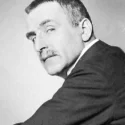Artist Profile
Frank Wedekind (1864-1918) was a prophet in the darkness. He had come before his time. A moralist who wore the mask of an immoralist, he had been the terror of the German bourgeoisie, alternately praised for being a saint and condemned for being a devil. He did not follow any group or subscribe to any political ideology of the day. His expressionistic visions preceeded the rise of expressionism by several decades. During Wedekind’s lifetime, hs plays were persecuted and only performed in censored versions. They were considered pure poprnography, for he dared to deal with issues of sexual freedom and release, problems of puberty, moments of ecstasy between the sexes, and moments of misunderstanding and violence. Wedekind’s language was brilliant and poetic, constructed mainly of cascades of short one-line sentences often consisting of only one or two words, like verbal exchanges between pistols. His plays broke through all the cliches of the theatre of his time, and today he is considered one of the founders of modern drama. In 1918, Bertolt Brecht attended his funeral. He later wrote in his diary, “They stoodd perplexed in top hats, as if round the carcass of a vulture. Bewildered crows.”

